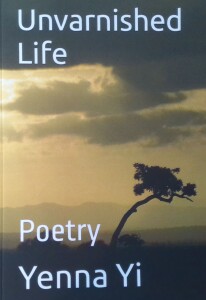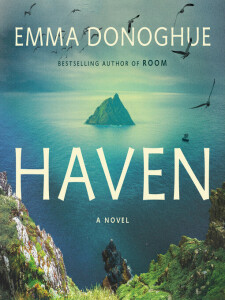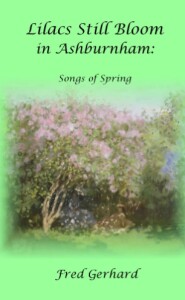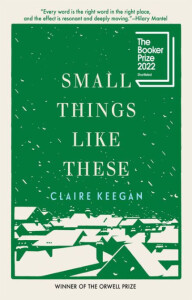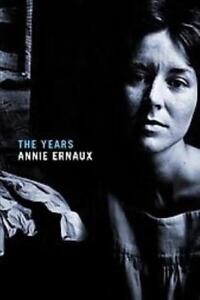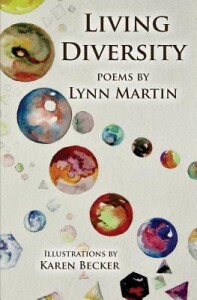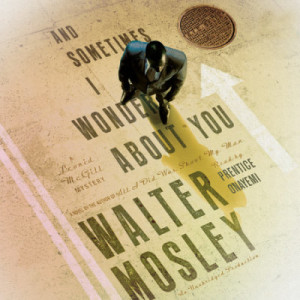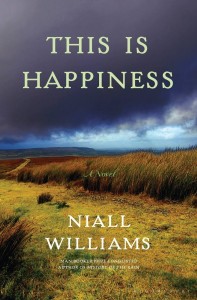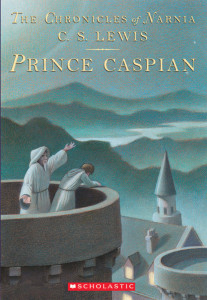
When I ran across Matt Mikalatos‘s blog posts on rereading C.S. Lewis’s work, I was inspired to look again at the Narnia books. In Prince Caspian, a sequel to the first book, Peter, Susan, Edmund and Lucy are about to board a train back to school when they are suddenly whisked off to the world of The Lion, the Witch and the Wardrobe, though they do not recognise it at first because over a thousand years have passed.
Narnia is now ruled by Miraz who became Lord Protector of his nephew Caspian upon the death of Caspian IX but now calls himself the king. Miraz prohibits any mention of Old Narnia: the talking animals, dwarves, the dryads and other what we would call mythological beings, and most of all Aslan himself. He dismisses Caspian’s nurse for telling the child such stories and replaces her with a tutor.
Dr. Cornelius turns out to be just as devoted to the old ways but more circumspect, and it is he who warns Caspian to escape when a son is born to Miraz and his wife, thus putting Caspian’s life in danger. Peter, Susan, Edmund and Lucy, who had become Kings and Queens in Old Narnia are dragged back to help Caspian and the remaining Old Narnians in their attempt to restore the rightful king to his throne.
I came to the Narnia books in my late teens, not as a child, but it was a time in my life when I was on the lookout for magic, spending time in the woods, studying Transcendentalism, and caught up in the 1960s whirl of possibilities. Charmed by the magical aspects of the Narnia books, I found the overtly Christian foundation a little off-putting, though tried to fit it into my then-exploration of different religions. I was also dismayed by the treatment of women and what I now know as colonialism, but recognised where these fit in the context of Lewis’s time.
On rereading the book now, I’m less struck by the religious overtones than by the similarity to today’s political climate. As Mikalatos says:
Imagine, if you will, a political climate in which truth has been completely discarded. Even the history books are full of falsehoods that advance the narrative of those ruling the nation. Stories of the past have been ignored, abused, or outlawed. In the midst of this political rule, certain classes of people have been persecuted, harmed, sent into hiding.
That is the world of Narnia during Prince Caspian.
As Hamlet says: “The time is out of joint—O cursèd spite, / That ever I was born to set it right!” Lewis himself said the book was about the “restoration of the true religion after corruption.” Leaving aside the religious aspect, the theme of a disordered world needing to be set right can’t help but resonate for me as I watch so many people who claim to follow democratic ideals betray them. At one point, after the children have been attacked by a non-talking bear, Lucy says:
“Wouldn’t it be dreadful if some day, in our own world, at home, men started going wild inside, like the animals here, and still looked like men, so that you’d never know which were which?”
Lucy’s question about talking and non-talking animals illustrates a technique that Lewis deploys throughout the book of using pairs as foils or complements. We have Prince Caspian and the four children; the separate narratives of the boys who pursue the war against Miraz and the girls who with Aslan dance and sing and awaken the Old Narnians. The latter pairing carries forward the scene early on when Dr. Cornelius takes young Caspian up to the tower to witness the conjunction of the two stars Tarva, The Lord of Victory, and Alambil, the Lady of Peace, which together indicate a great good is coming to Narnia. Note that both victory and peace are needed.
There’s also the contrast between belief and skepticism. In the first book it was Lucy who first visited Narnia and the others did not believe her. Here, she is the first to see Aslan and the others say they do not believe her, with terrible consequences. Believing in Aslan and the Golden Age of Narnia is what sets Miraz and his people apart from Caspian and his magical beings. I don’t see belief and skepticism as absolute good and evil, though understand why Lewis made them such here. To me, like victory and peace, both are needed.
Lucy’s reaction to not being believed illuminates a more important theme, that of doing the right thing even when no one around you agrees with you. Of course, the difficulty is that even they think they are doing the right thing, though as in this case a deeper look at their motives reveals more complexity. The question of what authority to follow is here handed off to religion, the old religion of Aslan. In our world and as adults this question has become more complex.
Much of my thinking about this book has been informed by Mikalatos’s posts and the ensuing discussions on them. He says of Lewis: “For him this is all about myth and fairy tales and what they signify. The stories we love are all about deeper truths.”
In my creative writing classes I often talk about tackling big ideas. As Donald Maass says in Writing the Breakout Novel:
A breakout novelist needs courage, too: the courage to say something passionately. A breakout novelist believes that what she has to say is not just worth saying, but it is something that must be said. It is a truth that the world needs to hear, an insight without which we would find ourselves diminished.
What deeper truth has a book you’ve read recently explored?
